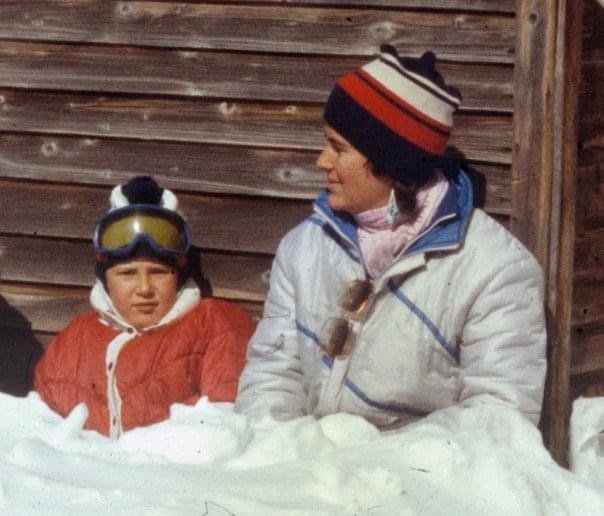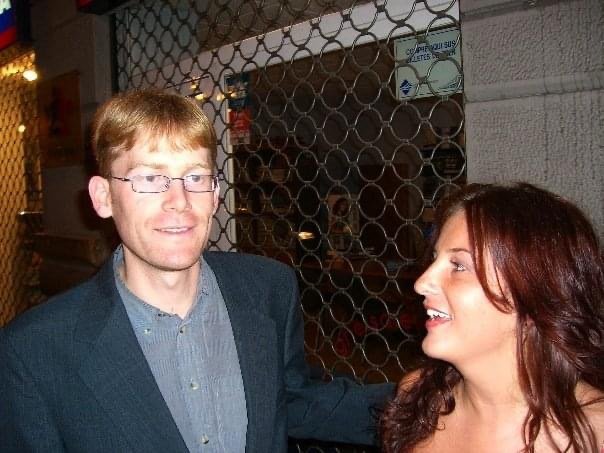Navigating A Brave New Digital Earth World with Agnieszka Lukaszczyk
Space policy expert Agnieszka Lukaszczyk works at the Earth-imaging satellite company Planet. When we spoke to her a year ago, she was pregnant with plans to give birth in her home country Poland. A borderland away, Russian forces had invaded Ukraine.
I was sobbing. I know I’m hormonal, but I was thinking, what kind of world am I bringing my child into?
If someone had a pragmatic answer to her existential question, that person would be the expectant mother herself.
As Planet’s Vice President of Government Affairs, Agnieszka helps international leaders embrace a satellite constellation’s view of the world. Her knack for networking and drive to solve global challenges makes her an ideal liaison between a commercial satellite company and government institutions around the globe.
Agnieszka describes her role as more of an educator than a lobbyist. Even today’s world leaders struggle to grasp the full spectrum of satellite data applications.
People still ask if you work in space, are you looking for aliens? No, but here’s how I can help with your urban or agricultural development portfolio. I reassure people that satellites aren’t some weird sci-fi thing but actually useful tools that address a wide range of issues on Earth.
Welcome to the New Space Market for Commercial Earth Observation
Getting directions on our cellphones to securing banking transactions to powering up our electric grids — satellite technologies drive much of our everyday digital infrastructure. Developed by governments in the 70s and 80s, satellites were let loose on the marketplace in the 90s. Fast forward to today, satellites have shrunk, launches are cheaper, and emerging technologies have disrupted the industry. Swarms of new satellite companies compete to revamp hardware designs and create innovative twists to their services.
Planet was among the first to emerge in the new space marketplace, with its founders tinkering away in the proverbial start-up garage around 2010. Today, the company is a public benefit corporation with a fleet of roughly 200 satellites that capture a daily stream of Earth images. No other satellite company offers their cadence of whole-Earth images.
Planet prides itself on pushing its do-good mission to make Earth data not just visible but accessible and actionable. The company’s website is replete with striking Earth images that reveal how its technology has helped monitor and mitigate climate change, from mapping Arctic permafrost thaw for scientists to tracking illegal land use in the Amazon for nonprofits working to reduce deforestation.
Satellite images of Ghana’s Apamprama Forest Reserve reveal human impact from 2019–2022. Source: Planet Scope.
While Planet’s image resolution is lower than some competitors, their image capture is constant. Their satellites survey the landscape over time. And that kind of global transparency makes Planet a watchdog of unfolding tragedies, including the war in Ukrainian over the past year.
Before tracking impacts in Ukraine, Planet’s satellites uncovered the Uyghurs detention camps in China, confirmed the mass burning of rural villages by the military in Myanmar, and exposed ongoing nuclear testing activities in remote regions of North Korea. Fact-checking human rights abuses for decision-makers to take action was a key factor that attracted Agnieszka to Planet.
We’ve had a factual kind of situational awareness in Ukraine. It’s been heartbreaking to see events unfold, but watching the mobilization of the Ukrainian people and how countries like Poland have welcomed hundreds of thousands of refugees shows that people can make a difference.
High resolution satellite images show the build up of vehicles and infrastructure at the Russian town of Yelnya between October 12 and December 29, 2021, ramping up concerns about an attack on Ukraine. Source: Planet’s Skysat
Not All Space Workers Are Trekkies
Early in her career, Agnieszka wanted to do public good. She never imagined working in the private sector, let alone having a career in the space industry. After receiving her Master’s degree in International Politics and Security from Washington D.C.’s American University, she filled out a blur of countless job applications. When she landed a job interview with the Space Generation Advisory Council (SGAC), Agnieszka thought it was a mistake.
I told them I’m completely incompetent. I know nothing about space. I haven’t even watched Star Trek!
As it turns out, the SGAC needed someone with a policy background, not a Trekkie. She was hired in 2006 by the council’s chair Will Marshall, and eventually worked alongside SGAC members Chris Boshuizen and Robbie Schingler ― all three of whom would later co-found the company Planet.
It was the early days of the volunteer youth organization, disorganized with few funds. But as Agnieszka puts it, "At some point in your career, you learn how to clean the toilets." Menial work aside, Agnieszka organized sponsorships for young professionals wanting to work in the space industry. She built partnerships with agencies like NASA, ESA, and the UN. And then her six-month SGAC stint morphed into an actual space career.
People think space is a waste of money considering problems on our planet. At SGAC, I got to see the flip side of space, not just looking up but looking down. I saw the global impacts of space technologies and how nobody knew about them. That’s how I got hooked on space.
Crossing Continents, Cultures, and the Gender Divide
Young Agnieska in Poland.
Growing up in Communist Poland, Agnieszka understands why people think space is extravagant. She remembers the childhood excitement at Christmas, waiting for the green bananas on her window sill to turn yellow. Bananas were for special occasions only, as her mother had to queue for long hours for the exotic fruit. For her, there were no luxuries like Barbie dolls or Legos.
Young Agnieszka got a glimpse of the political changes happening in Poland. She recalls that her father was arrested for possessing a crumbled-up U.S. dollar bill, the antithetical symbol of communist rule, and her grandfather was an active member of the country’s underground Solidarity movement that eventually toppled Poland’s communist government.
As a teenager, Agnieszka experienced the flip side of the coin when her family moved to the U.S., eventually settling in Tennessee. As a foreign kid with funny clothes and a different twang, Agnieszka describes the move across continents and cultures during those awkward teen years as a humbling experience. The cultural upheaval instilled in her a special kind of grit that would serve her later as a woman launching her career in the predominantly male-dominated space industry.
After my first presentation at the United Nation’s Committee on the Peaceful Uses of Outer Space, an ambassador told me I better start thinking about a family because I’d never make it in the space sector.
Agnieszka attributes great mentors and her innate stubbornness as critical factors that helped push aside any doubts or feelings of inadequacy. She learned confidence without conceit, pointing out that nobody likes an arrogant person. While she confesses to being opinionated and provocative at times, she asserts that she has to speak up and push her agenda if she’s going to change the world for the better.
Global Transparency with an Open Data Mindset
After more years working for the European Space Policy Institute, the Secure World Foundation, and the European Union’s Space Program, Agnieszka bumped into her old SGAC colleagues who were now running their company Planet. They wanted a policy person who could ensure that their abundance of Earth Observation data could be put to good use by decision-makers in Europe and elsewhere.
Agnieszka with Planet co-founder Will Marshall.
I did not want to work in an industry driven by profits. But I joined Planet because I knew the founders. I knew they wanted to create a company that had a positive impact on the world, not as some PR stunt, but as a real objective.
As a public benefit corporation, Planet is responsible to its shareholders, not just to make profits but to serve its mission of using space technologies to help life here on Earth. The company stands out in the commercial satellite industry, publishing online a list of its ethical principles that include adamantly taking a stance against exclusive data. By democratizing access to their satellite data, Planet hopes humanity might have a fighting chance to behave peacefully and sustainably. Their hopes may seem lofty and ambitious, but the public has witnessed their commitment to global transparency, glimpsing at Planet’s satellite images during news coverage of Ukraine.
Reality Check — A Brave New Role in A Brave New World
A year after the birth of her son, we caught up with Agnieszka to find out about her new role as a working mom.
I have my little space cadet, and we travel the world together. I’m the type of woman who does everything 110%. I want to do it all and have it all. But I’m learning now, not all at once. I’m still figuring out my work-life balance.
Agnieszka decided against giving birth in her home country since Poland legislated new laws that would put her at risk if there were any birthing complications. Plus, the war in Ukraine raged on.
Since the start of the conflict, Agnieszka has noticed an increase in public awareness about the applications of Earth Observation satellite data. Even governments that traditionally rely on classified, exclusive data from their satellites recognize Planet’s Earth images add value to their situational awareness portfolios.
That’s been an eye-opener for defense operators. Security isn’t just about pointing weapons. It’s about food security, industrial security, border security, human security. Conflict creates a chain reaction that affects everything.
Over the past year, Planet has supported humanitarian operations in Ukraine, supplying satellite data to NGOs and intergovernmental bodies, including the NASA Harvest project that monitors and mitigates food shortages.
Analyzing satellite data, researchers monitored Ukraine’s wheat harvest last year. While crop outputs decreased, Ukrainian farmers were able to maintain most of their wheat supplies, with about 20% shipped to the global market. Forecasting Ukraine’s agricultural output abated concerns about this year’s food supplies to other vulnerable parts of the world.
Another crisis averted, thanks to the wonders of space technologies. Yet Agnieszka is tired of hyperbolic speak about the benefits of the space industry. She’s keen to burst the so-called space bubble from its echo chamber of self-aggrandizement and bring the work of satellites back down to Earth.
These days, I’m interested in looking at laws concerning biodiversity and climate change. I just want Earth Observation data to be a norm in the legislative world.
Since returning to work, she has succeeded at doing precisely that ― adding a few words to legislation recently passed by the European Union that compels companies to ensure and verify their products are deforestation-free. It’s a big win for our world’s forests that were reduced by an area the size of Europe over the past decade. It’s also a big win for Agnieszka, whose team lobbied lawmakers to include commercial space data as a normative tool to monitor and verify any future deforestation.









